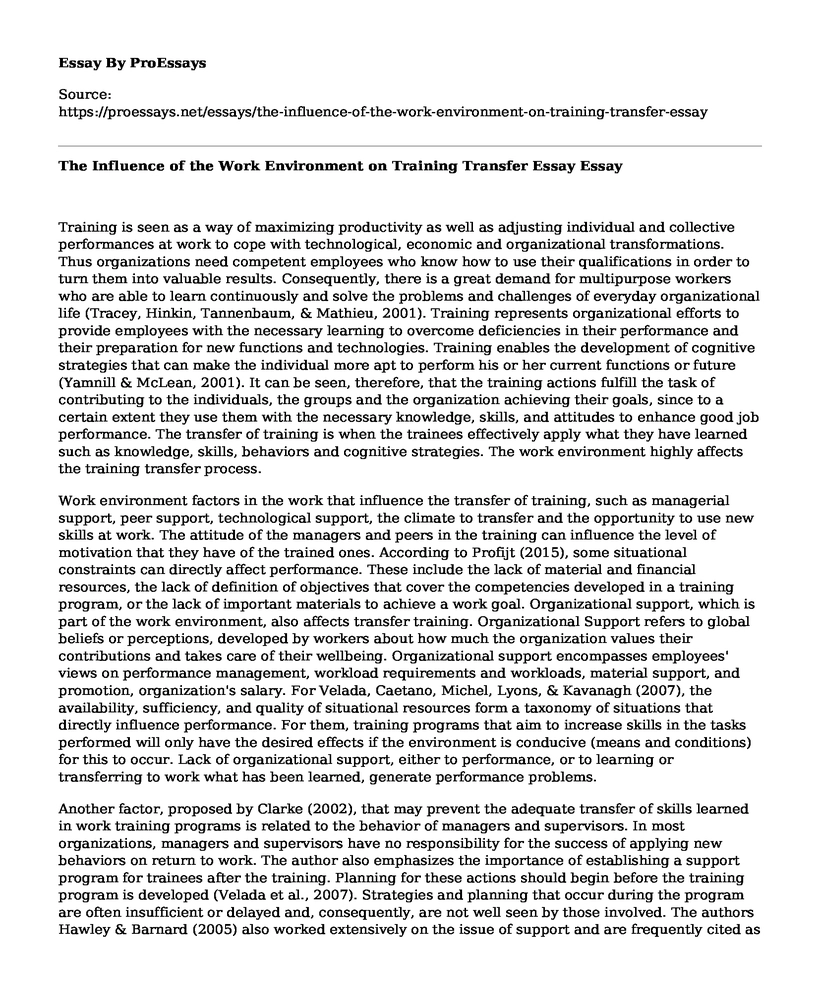Training is seen as a way of maximizing productivity as well as adjusting individual and collective performances at work to cope with technological, economic and organizational transformations. Thus organizations need competent employees who know how to use their qualifications in order to turn them into valuable results. Consequently, there is a great demand for multipurpose workers who are able to learn continuously and solve the problems and challenges of everyday organizational life (Tracey, Hinkin, Tannenbaum, & Mathieu, 2001). Training represents organizational efforts to provide employees with the necessary learning to overcome deficiencies in their performance and their preparation for new functions and technologies. Training enables the development of cognitive strategies that can make the individual more apt to perform his or her current functions or future (Yamnill & McLean, 2001). It can be seen, therefore, that the training actions fulfill the task of contributing to the individuals, the groups and the organization achieving their goals, since to a certain extent they use them with the necessary knowledge, skills, and attitudes to enhance good job performance. The transfer of training is when the trainees effectively apply what they have learned such as knowledge, skills, behaviors and cognitive strategies. The work environment highly affects the training transfer process.
Work environment factors in the work that influence the transfer of training, such as managerial support, peer support, technological support, the climate to transfer and the opportunity to use new skills at work. The attitude of the managers and peers in the training can influence the level of motivation that they have of the trained ones. According to Profijt (2015), some situational constraints can directly affect performance. These include the lack of material and financial resources, the lack of definition of objectives that cover the competencies developed in a training program, or the lack of important materials to achieve a work goal. Organizational support, which is part of the work environment, also affects transfer training. Organizational Support refers to global beliefs or perceptions, developed by workers about how much the organization values their contributions and takes care of their wellbeing. Organizational support encompasses employees' views on performance management, workload requirements and workloads, material support, and promotion, organization's salary. For Velada, Caetano, Michel, Lyons, & Kavanagh (2007), the availability, sufficiency, and quality of situational resources form a taxonomy of situations that directly influence performance. For them, training programs that aim to increase skills in the tasks performed will only have the desired effects if the environment is conducive (means and conditions) for this to occur. Lack of organizational support, either to performance, or to learning or transferring to work what has been learned, generate performance problems.
Another factor, proposed by Clarke (2002), that may prevent the adequate transfer of skills learned in work training programs is related to the behavior of managers and supervisors. In most organizations, managers and supervisors have no responsibility for the success of applying new behaviors on return to work. The author also emphasizes the importance of establishing a support program for trainees after the training. Planning for these actions should begin before the training program is developed (Velada et al., 2007). Strategies and planning that occur during the program are often insufficient or delayed and, consequently, are not well seen by those involved. The authors Hawley & Barnard (2005) also worked extensively on the issue of support and are frequently cited as a reference by researchers in the field. The analyses indicated that the more positive the organizational climate for transfer of training, the better the performance of behaviors learned in the course performed. They also found that trainees who scored higher on apprenticeship scores performed better on return to work.
Conclusion
It can then be said that training alone does not guarantee the positive and lasting impact of what has been learned in the workplace. It is fundamental to adopt post-training management strategies that guarantee an organizational environment that allows the transfer of the skills learned. Organizational support influences people's own learning process and motivation. In the case of new skills, it is very difficult to use new skills, and this impairs learning and the transfer of newly acquired skills to work.
References
Clarke, N. (2002). Job/work environment factors influencing training transfer within a human service agency: Some indicative support for Baldwin and Ford's transfer climate construct. International journal of training and development, 6(3), 146-162.
Hawley, J. D., & Barnard, J. K. (2005). Work environment characteristics and implications for training transfer: A case study of the nuclear power industry. Human resource development international, 8(1), 65-80.
Profijt, J. (2015). The influence of the work environment on training transfer (Master's thesis, University of Twente).
Tracey, J. B., Hinkin, T. R., Tannenbaum, S., & Mathieu, J. E. (2001). The influence of individual characteristics and the work environment on varying levels of training outcomes. Human resource development quarterly, 12(1), 5-23.
Velada, R., Caetano, A., Michel, J. W., Lyons, B. D., & Kavanagh, M. J. (2007). The effects of training design, individual characteristics and work environment on the transfer of training. International journal of training and development, 11(4), 282-294.
Yamnill, S., & McLean, G. N. (2001). Theories supporting the transfer of training. Human resource development quarterly, 12(2), 195-208.
Cite this page
The Influence of the Work Environment on Training Transfer Essay. (2022, Nov 20). Retrieved from https://proessays.net/essays/the-influence-of-the-work-environment-on-training-transfer-essay
If you are the original author of this essay and no longer wish to have it published on the ProEssays website, please click below to request its removal:
- Collaboration Software Tools
- Article Analysis Essay on Colour of Bile Vomiting in Intestinal Obstruction in the Newborn
- Article Analysis Essay on Product Strategy
- Leadership & Ethics: The Ethical Lens Inventory - Essay Sample
- Paper Example on Women Leaders: Breaking Through the Glass Ceiling
- Paper Sample on Maximizing Shareholders Wealth: The Benefits of a Good Capital Structure and Financing Strategy
- Free Essay Example on Addressing Nursing Shortage: Educational Background, Expertise







